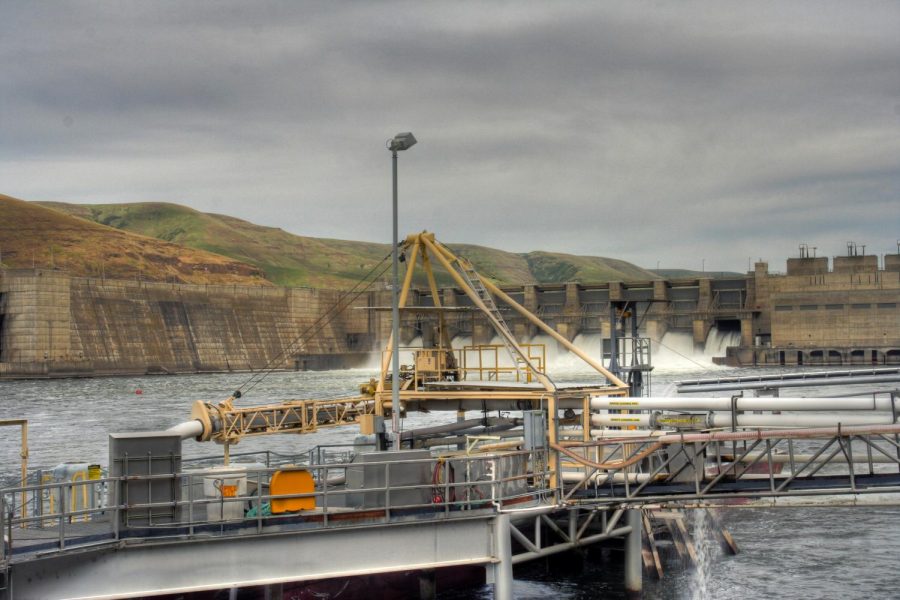Organization teaches Nez Perce traditions, environmental activism
Lower Granite Dam
March 31, 2020
Since 2015 the nonprofit organization Nimiipuu Protecting the Environment has been dedicated to educating people on the environment, Nez Perce traditions and how to preserve for future generations.
Nimiipuu Protecting the Environment works closely with the Nez Perce tribe but they do not work for them. Co-founder and coordinator Julian Matthews said the organization meets with the Nez Perce tribal government twice a year and works together with them, but their independence allows them to speak on issues and take stances the tribal government might not take.
Matthews said their original goal with Nimiipuu Protecting the Environment was to increase focus in the Nez Perce tribe on environmental issues such as the decreasing salmon population or wolf killings. Now Matthews said the organization seeks to get everyone more involved in the environment.
“[Nez Perce] had treaty rights … when they signed that, they were looking out for our interest,” Matthews said. “What we’re trying to do is ensure that we — my generation — are working with the kids to protect this area.”
” … we would like to keep our traditional sights and we would like to keep the treaties followed, which sometimes they are not.”
Lucinda Simpson, Nez Perce tribal elder
The organization was started in 2015, after Matthews and co-founder Elliott Moffett helped the Nez Perce in a lawsuit against industrial rigging company Omega Morgan. The company was trying to transport mega load trucks filled with mining equipment across Nez Perce territory without permission of the tribal government, Moffett said, and the tribe sued and won the lawsuit.
After that, Moffett said they formed the organization to encourage environmental activism and teach traditional ecological knowledge, a field focusing on how indigenous peoples have managed the earth.
One of the environmental issues they’re heavily involved with is the removal of the four Lower Snake River Dams: Ice Harbor, Lower Monumental, Little Goose and Lower Granite. For the past four years, Nimiipuu Protecting the Environment has arranged flotilla protests once a year to fight for its removal. Moffett said the organization wants to save the salmon and steelhead populations and free up the river.
One of their most prominent programs are their workshops with 4th and 5th graders from local schools. Nimiipuu Protecting the Environment member and Nez Perce tribal elder Lucinda Simpson said their classes include making bracelets, necklaces and teaching Nez Perce culture and tradition, like what plants to burn to keep away bad spirits.
Simpson said her family was able to hold on to their traditions, and everything she teaches the children was passed down to her from her mother and grandmother. Simpson said she wants to keep these traditions alive.
“I [teach] them about our culture and tradition, that we are still here and we need to maintain our culture and tradition in order to be a tribe,” Simpson said.
Another thing the organization does is host and attend educational summits relating to environmental issues. Recently they spoke on the Lower Snake River Dams issue at an environmental summit hosted in the Native Center at WSU. Members also talk to local and state representatives and bring their issues to them.
“We talk to them about these different issues we have, we let them know that we are stakeholders and we would like to see the salmon remain … we would like to keep our traditional sights and we would like to keep the treaties followed, which sometimes they are not,” Simpson said.
Moffett said students can help by getting information out and teaching people about the science behind the environment, the economics behind it and how indigenous people look at protecting and enhancing it.
Matthews said the most important thing students can do to help is get educated and get involved in environmental activism. He said he wants to work with WSU and University of Idaho students more to get students involved in the environmental work they do while incorporating new ideas.
“It’s not like it’s my environment, it’s everyone’s environment,” Matthews said. “We’ll all be impacted if we don’t take care of it right now.”
Editor’s note: This article was amended to correct a reference to the Lower Snake River Dams, which was previously referenced in the singular.









